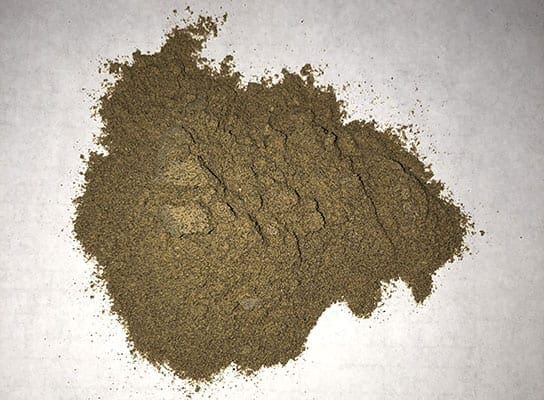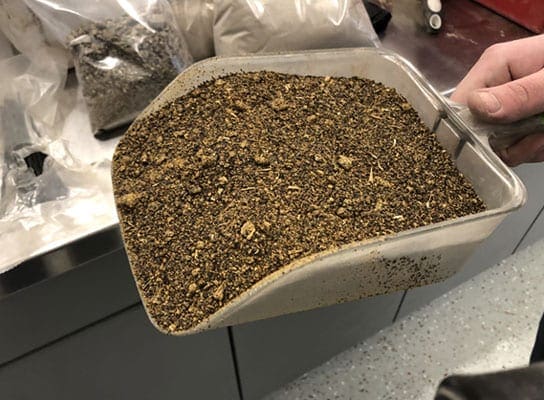Izberite jezik:
The STET elektrostatična ločevanje Postopek je popolnoma suh, ne potrebujejo vode ali kemikalij. Dry elektrostatična ločitev metode ponujajo priložnost za ustvarjanje novih in bolj funkcionalnih rastlinskih beljakovin proizvodov, including canola seed meal or rapeseed meal with increased protein content for use as a high-value animal feed. This protein-enriched seed meal can be used as a non-GMO replacement for soy meal and add value to oil-crushing operators and feed producers.
A sample of solvent-extracted canola meal was purchased by STET for pilot testing. Canola obrok je bil fino mlet (Suho) uporaba mlina s kladivom. Od začetne velikosti delcev (D50) od 500 mikronov, the canola meal was reduced to a fine particle size appropriate for the STET separator at an energy consumption of less than 60 kW na tono. Fino mleto seme canola obrok je pokazal odlično ločevanje beljakovin. Vzorec krme, ki vsebuje 36-38% beljakovin (suha podlaga) was separated into a protein-enriched product in a single pass through the STET separator.

The STET tribo-electrostatic Ločilni pas demonstrated the capability to process finely ground canola meal to significantly upgrade the protein content, making it more valuable as animal feed. The only material that was prepared prior to its introduction into the STET separator was grinding, ki je bila uspešno opravljena z uporabo kladiva, zrela tehnologija, ki je že v razširjeni uporabi v predelovalni industriji oljnih sejm. The STET triboelectric belt separator offers many benefits for processing canola seed meal and rapeseed meal, including continuous operation, visoko stopnjo krme do 15 tone na uro krme, Nizka poraba energije, ease of operation, and high mechanical reliability.

The name “rapeseed” comes from the Latin word “rapum,” which means turnip. Rapeseed belongs to the Brassicaceae family, which includes cabbage and mustard, sharing similar characteristics with root crops like turnips.
Rapeseed and canola are closely related but not identical. Canola is a variety of rapeseed that has been selectively bred to have lower levels of erucic acid, making it safer for consumption and more suitable for oil production.
The primary difference between a canola meal and a rapeseed meal lies in their content of erucic acid and glucosinolates. Canola meal is made from canola, which has low levels of these components, while rapeseed meal may have higher levels, affecting its suitability for some applications.
Rapeseed meal is a valuable protein source in animal diets, providing essential amino acids for livestock. It is often used as an affordable alternative to soy meal, boosting the nutritional content of feed and supporting healthy growth and productivity in animals.
Rapeseed meal contains essential nutrients like proteins, Vlaken, and minerals, which are beneficial for animal nutrition. Vendar, traditional rapeseed meal may also contain antinutrients and toxicants such as glucosinolates and erucic acid, necessitating processing to reduce these components for safe and effective use in feed.